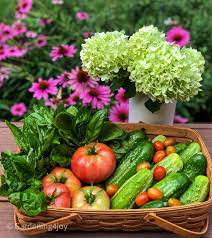The Benefits of Organic Gardening
Organic gardening is a sustainable and environmentally friendly approach to growing plants, fruits, and vegetables without the use of synthetic chemicals or pesticides. By working in harmony with nature, gardeners can create healthy ecosystems that support plant growth and biodiversity.
One of the key benefits of organic gardening is the promotion of soil health. Organic practices such as composting, mulching, and crop rotation help improve soil structure, fertility, and microbial activity. Healthy soil leads to healthier plants with increased resistance to pests and diseases.
Organic gardening also contributes to a safer environment for humans, wildlife, and beneficial insects. By avoiding harmful chemicals, organic gardeners protect pollinators like bees and butterflies, as well as other beneficial organisms that play vital roles in ecosystem health.
Furthermore, organic gardening promotes sustainable food production by reducing reliance on fossil fuels for synthetic fertilizers and pesticides. By using natural methods to control pests and enrich the soil, organic gardeners help conserve resources and reduce their carbon footprint.
In addition to environmental benefits, organic gardening can also lead to improved nutrition in the food we grow. Studies have shown that organically grown fruits and vegetables often contain higher levels of vitamins, minerals, and antioxidants compared to conventionally grown produce.
Whether you have a small backyard garden or a larger plot of land, embracing organic gardening practices can have a positive impact on your health and the planet. By nurturing your garden organically, you are not only creating a beautiful outdoor space but also contributing to a more sustainable future for generations to come.
5 Essential Tips for Cultivating a Thriving Organic Garden
- Use compost to enrich the soil and provide essential nutrients for plants.
- Practice crop rotation to prevent soil depletion and reduce pest infestations.
- Encourage beneficial insects like ladybugs and bees to help control pests naturally.
- Mulch around plants to retain moisture, suppress weeds, and improve soil structure.
- Avoid using synthetic pesticides and fertilizers to maintain a truly organic garden.
Use compost to enrich the soil and provide essential nutrients for plants.
Using compost in your garden is a sustainable and effective way to enrich the soil and supply essential nutrients to your plants. Compost is a valuable organic material made from decomposed kitchen scraps, yard waste, and other organic matter. By incorporating compost into your garden beds, you can improve soil structure, increase moisture retention, and enhance nutrient availability for plant growth. This natural fertilizer not only helps plants thrive but also promotes a healthy ecosystem in your garden by reducing the need for chemical fertilizers and supporting beneficial soil organisms.
Practice crop rotation to prevent soil depletion and reduce pest infestations.
Practicing crop rotation in your organic garden is a valuable technique to maintain soil fertility, prevent depletion of nutrients, and minimize pest infestations. By rotating crops each season, you can disrupt the life cycles of pests and diseases that target specific plants, reducing the need for chemical interventions. Additionally, different crops have varying nutrient needs, so rotating them helps balance the soil’s nutrient levels naturally. This sustainable approach not only benefits your garden’s health but also contributes to a thriving ecosystem that supports plant growth and biodiversity.
Encourage beneficial insects like ladybugs and bees to help control pests naturally.
Encouraging beneficial insects such as ladybugs and bees in your garden is a smart and effective way to naturally control pests. Ladybugs are voracious predators of aphids, mites, and other harmful insects, while bees play a crucial role in pollination. By creating a welcoming environment for these beneficial insects through diverse plantings, avoiding pesticides, and providing shelter, you can establish a balanced ecosystem where pest populations are kept in check without the need for harmful chemicals. Embracing these natural allies not only promotes a healthier garden but also contributes to the overall biodiversity and resilience of your outdoor space.
Mulch around plants to retain moisture, suppress weeds, and improve soil structure.
Mulching around plants is a simple yet effective way to enhance your garden organically. By adding a layer of mulch, you can help retain moisture in the soil, reducing the need for frequent watering while also creating a barrier that suppresses weed growth. Additionally, mulch gradually breaks down over time, enriching the soil with organic matter and improving its structure for healthier plant growth. Incorporating mulching into your gardening routine is a sustainable practice that benefits both your plants and the overall health of your garden ecosystem.
Avoid using synthetic pesticides and fertilizers to maintain a truly organic garden.
To maintain a truly organic garden, it is essential to avoid using synthetic pesticides and fertilizers. By steering clear of these chemical inputs, gardeners can protect the health of their plants, soil, and surrounding ecosystem. Instead, opt for natural alternatives such as compost, mulch, companion planting, and beneficial insects to manage pests and nourish your garden in a sustainable way. Embracing organic practices not only fosters a healthier environment but also ensures that your garden thrives naturally and harmoniously with nature’s rhythms.

